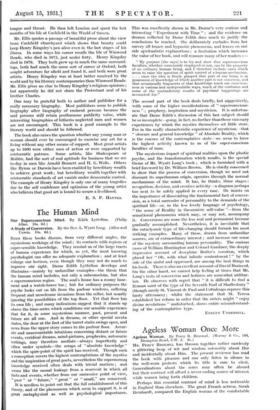The Human Mind
Our Superconsclous Mind. By Edith Lyttelton. (Philip Allan. 10s. 6d.) A Study of Conversion. By the Rev. L. Wyatt Lang. (Allen and Unwin. 10s. 6d.) BOTH these books discuss, from very different angles, the mysterious workings of the mind ; its contacts with regions of super-sensible knowledge. They remind us of the large tracts of human experience for which, as yet, the most knowing psychologist can offer no adequate explanation ; and at least enlarge our horizon, even though they may not do much to improve our sight. Dame Edith Lyttelton develops and illustrates—mainly by unfamiliar examples—the thesis that the human mind includes, not only a subconscious, but also a superconscious region. The soul's house has a roomy base- ment and a watch-tower too ; but for ordinary purposes the psyche looks out on life from the parlour windows, suffering frequent and unwelcome invasions from the cellar, but usually ignoring the possibilities of the top floor. Yet that floor has its own life ; and many indications suggest that it stands up
above the time-series which conditions our sensible experience that for it, in some mysterious manner, past, present and future are all one. And in dreams, or other special menta states, the door at the foot of the turret stairs swings open, and news from the upper story comes to the parlour floor. Accur- ate and unaccountable intuitions concerning distant or future events, veridical dreams, mind-pictures, prophecies, automatic writings, may therefore mediate—always imperfectly and often under symbols—the scraps of "absolute knowledge" which the spire-point of the spirit has received. Though such a conception covers the highest contemplations of the mystics and the inspiration of great poets, nevertheless the supernormal luiowledge received often deals with trivial matters ; and seems like the casual leakage from a reservoir in which all facts and events, whether from our successive point of view, " past" or "future," " great " or "small," are conserved. It is needless to point out that the full establishment of this theory, and of the phenomena which seem to support it, is of great metaphysical as well as psychological importance. This was excellently shown in Mr. Dunne's very curious and interesting "Experiment with Time " ; and the evidence on dreams collected by Dame Edith does much to justify the conclusions he reached. She deliberately excludes from her survey all trance and hypnotic phenomena, and leaves on one side spiritualistic explanations ; a limitation which increases the value of her book, and will reassure many of her readers :—
" My purpose [she says] is to try and show that superconscious faculties, whether consciously employed or not, can be the property of an ordinary human being, and I therefore exclude cases which seem to raise the question of spirit control of a human mechanism. . . . once the idea is firmly grasped that part of our being is in possession of knowledge of which another part is not conscious, and that occasionally fragments of that knowledge reach our conscious- ness in various and undependable ways, much of the confusion and some of the contradictory results of psychioal happenings are accounted for."
The second part of the book deals briefly, but suggestively, with some of the higher manifestations of " superconscious- ness " ; prophecy, inspiration and mysticism. It is unfortun- ate that Dame Edith's discussion of this last subject should be so incomplete—going, in fact, no further than those visionary experiences by which the mystics themselves set little store. For in the really characteristic experience of mysticism—that "obscure and general knowledge" of Absolute Reality, which is the essence of the contemplative state—we seem to have the highest activity known to us of the super-conscious faculties of man.
The mysterious impact of spiritual realities upon the plastic psyche, and the transformation which results, is the special theme of Mr. Wyatt Lang's book ; which is furnished with a brief foreword by Dr. William Brown. He is chiefly concerned to show that the process of conversion, though we need not discount its superhuman origin, operates through the normal mechanisms of the mind. It has, he thinks, three stages : recognition, decision, and creative activity—a diagram perhaps too neat to be safely applied in every case. He insists on the importance of dissociating the fundamental fact of conver- sion, as a total surrender of personality to the demands of the spiritual life—or, in the less lovely language of psychology, "the sense of Reality in theocentric self-value "—from the sensational phenomena which may, or may not, accompany it. Conversions are none the less real and permanent because gradually accomplished. Nevertheless, it is inevitable that the cataclysmic type of life-changing should furnish his most striking examples. Many of these, drawn from unfamiliar sources, are of extraordinary interest ; and increase our sense of the mystery surrounding human personality. The curious cases of William Huntington and Colonel Gardiner, the deeply impressive account of Josephine Butler's vocation, which placed her "Oh, with what infinite contentment ! " by the side of the sinful and oppressed, are among the best things in his book. There is also an excellent account of David Brainerd. On the other hand, we cannot help feeling at times that Mr. Lang's tests of conversion and holiness are somewhat utilitar- ian. He observes with regret that "it is difficult to find a Roman saint of the type of the Seventh Earl of Shaftesbury" (though surely St. Vincent de Paul and Cottalengo reprove this hasty utterance) ; whilst the statement that St. Teresa established her reform in order that the sisters might "enjoy divine revelations" undisturbed, shows entire misunderstand-






























 Previous page
Previous page